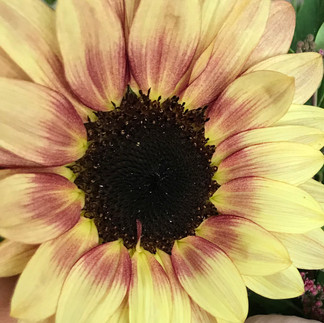Why Buy Local?
- Lisanne Budd

- May 29, 2024
- 3 min read
Have you ever considered the difference between store-bought and locally-grown flowers? I know it never crossed my mind until I delved into the idea of starting a flower farm, and what I found was startling! As it turns out, flowers can come with some pretty awful baggage.

Photo by Dmitry Ratushny on Unsplash
In the 1960s, there was a significant shift in the flower production industry. Cargo planes became capable of transporting flowers worldwide. Flower farms from other countries were eager to gain a foothold in the US market. The ensuing practices were and still are harmful to people and the environment. How?
Understand these flower farms have some hurdles to overcome. First, they must grow and ship flowers cheaply to compete with local flower farms. Second, flowers are not naturally capable of traveling long distances. Therefore, some alterations to the flower itself are necessary. The result is stiff, scentless, copy-and-paste flowers that have replaced unique and fragrant blooms.

But, as I alluded, there is a much deeper and darker cost too. During growth, these plants are repeatedly sprayed with chemicals, considered so dangerous they are banned in the US. After harvesting, the flowers are sprayed or bathed several times with more chemicals to ensure they are free from invasive bugs or diseases and to prevent them from rotting in transport. After placing them in excessive packaging, they are flown and driven an average of 2,500 miles before arriving at your local store roughly one week after being picked.
All of this adds up to a huge carbon footprint! Additionally, we place flowers on our kitchen or dining room tables containing chemicals that have no business being in close proximity to our food. We fruitlessly try to capture a waft of their scent, gaining a healthy dose of fungicides, pesticides, and more in our lungs instead. We haven't even touched on the desert zones created around these farms, as they steal more than their share of the local water supply while simultaneously treating their employees deplorably.

Photo by Anna Sullivan on Unsplash
Compare that to locally grown flowers. Flowers grown close to home are alluringly beautiful, each unique in its charm. Industrial farms have not figured out how to ship many flowers such as dahlias, cosmos, zinnias, lisianthus, and, oh, so many more. When you purchase from a local farmer, you will likely see many flowers unavailable elsewhere. You may also see stunning colors uncommon or non-existent in the floral industry.
Beyond beauty, most local flowers are sustainably grown, with many farms utilizing organic or regenerative farming practices. These farmers have an eye for future generations and work to improve soil, increase pollinators, and conserve natural resources. Additionally, they resist using chemicals, especially harmful ones. The carbon footprint of these flowers is not even the size of a pinky toenail compared to that of anything purchased from the floral industry!

When you buy local flowers, you intuitively know that someone strolled through a field carefully selecting blooms just for your bouquet, presenting them with as simple packaging as possible. You feel the joy of knowing these flowers spent most of their life growing in the field, getting natural rain and sunshine. You imagine the birds, bees, and butterflies that enjoyed snacking on them before moving along to pollinate nearby food crops. And, you recognize that your purchase is helping to encourage a healthy ecosystem and provide food on all our tables.

With all these thoughts and feelings swirling inside you, they beckon you to bury your nose in them and breathe deeply. When you do, instead of chemicals, your olfactory system is greeted with fabulous fragrance. Depending on the type of flowers, it may be subtle or strong. As you inhale, you are filled with a sense of pride, knowing your purchase brings you pleasure and helps your community in many ways.
We are proud to be part of a new movement towards sustainably grown, locally sourced, and seasonal flowers. We hope you will join us!







Comments